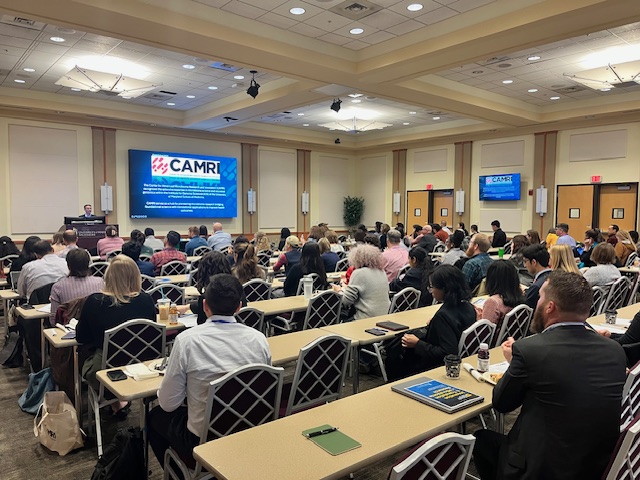New Microbiome Research Center CAMRI Established in School of Medicine
August 08, 2025 Heide Aungst
Read more about the center that launched earlier this year in the latest issue of “CATALYST.”
Photo: The Center for Advanced Microbiome Research and Innovation officially launched in March at the Mid-Atlantic Microbiome Meet-Up attended by microbiome scientists from the D.C.-Delaware-Virginia-Maryland area. Photo by Heide Aungst
Probiotics are all the rage. Everyone from influencers to your best friend raves about the amazing benefits for overall wellness. Companies tout less bloating, better digestion, relief of brain fog, and mood enhancement when balancing the gut microbiome.
The truth, however, is that probiotics are not regulated by the Food and Drug Administration (FDA) and using them to treat conditions could cause other health issues, says Jacques Ravel, PhD, director of the new Center for Advanced Microbiome Research and Innovation (CAMRI) at the University of Maryland School of Medicine (UMSOM). The gut microbiome’s role in infant health is just one area of research that Ravel and his colleagues study at CAMRI.
CAMRI officially launched in March at the Mid-Atlantic Microbiome Meet-Up hosted by CAMRI on the University of Maryland, Baltimore (UMB) campus and attended by microbiome scientists from the D.C.-Delaware-Virginia-Maryland area. Wide-ranging microbiome science was discussed, from the environmental microbiome of the Chesapeake Bay to non-human microbiomes from cheetahs to cheeses, and, of course, the human microbiome — the specialty of CAMRI’s faculty.
CAMRI’s establishment recognizes the extensive expertise in microbiome science and microbial genomics long held within the Institute for Genome Sciences (IGS) at UMSOM. CAMRI now serves as a hub for pioneering microbiome research — bridging foundational science with translational applications to improve health outcomes.
Why Study the Microbiome?
The microbiome is a community of microorganisms such as bacteria, fungi, or viruses that live in the human body — the gut, mouth, and vagina — and on the skin. Disruptions or imbalances of these communities are often implicated in diseases, such as irritable bowel syndrome, sexually transmitted infections (STIs), or tooth decay. Microbiome health also has been linked to systemic health issues, such as heart disease, cancer, preterm birth, and poor mental health. However, the “right” microbiome can offer protection from these outcomes.
With strength in women’s and infant health, CAMRI’s seven faculty members led by Ravel study the microbiome’s role in vaginal health, STIs, and maternal and infant birth outcomes, as well as not only the role of the gut microbiome in infant health but also in organ transplantation.
The popularity of microbiome centers has grown throughout the United States in recent years, with more than 80 located at universities and national laboratories. The growth recognizes that studying the microbiome’s impact on people and the environment is core to the life sciences.
CAMRI’s History
“Although we have recently formalized as a center, our history of innovating in research goes back 30 years to the sequence of the first free-living organism — Haemophilus influenza — by our IGS colleagues Claire Fraser and Owen White that launched the field of microbial genomics,” Ravel says.
At that time, Fraser and White worked at a now-defunct organization called The Institute for Genomic Research (TIGR) in Rockville, Md., that established the world’s first Microbial Sequencing Center. In 2007, Fraser brought many colleagues to UMSOM to launch IGS, including Ravel who had joined TIGR five years earlier.
In the first year of IGS, the National Institutes of Health (NIH) established the Human Microbiome Project (HMP) with the mission of generating resources to characterize the human microbiome and analyze its role in human health and disease. IGS received funding through HMP for multiple projects and established the HMP Data Analysis and Coordination Center under White’s leadership. The team followed with many more NIH-funded microbiome grants and impactful discovery to establish its leadership in the field.
The latest issue of "CATALYST" magazine highlights the School of Pharmacy's Mass Spectrometry Center; Police and Public Safety's comfort K9 Poe; the Costa Rica Faculty Development Institute; Bill Joyner, JD, MSW, of the Office of Community and Civic Engagement; the School of Social Work's B'more for Healthy Babies; the School of Medicine's work to develop physicians for rural areas; facts about the Universities at Shady Grove, and much more.